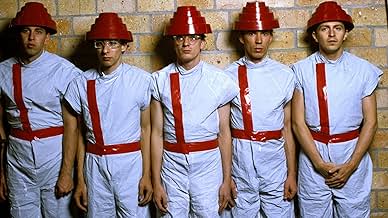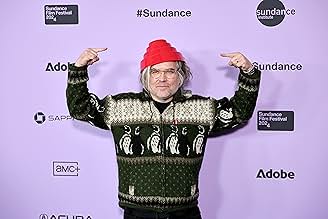En 1980, la banda de new wave Devo logró un éxito con "Whip It" y alcanzó reconocimiento popular con su mensaje de "des-evolución" social, formado en respuesta a los tiroteos de Kent State d... Leer todoEn 1980, la banda de new wave Devo logró un éxito con "Whip It" y alcanzó reconocimiento popular con su mensaje de "des-evolución" social, formado en respuesta a los tiroteos de Kent State de 1970.En 1980, la banda de new wave Devo logró un éxito con "Whip It" y alcanzó reconocimiento popular con su mensaje de "des-evolución" social, formado en respuesta a los tiroteos de Kent State de 1970.
- Premios
- 1 premio ganado y 1 nominación en total
- Self - Devo
- (as Jerry Casale)
- Self - Devo
- (as Bob Mothersbaugh)
- Self - Devo
- (material de archivo)
- (voz)
- Self - Devo
- (material de archivo)
- Self - Devo
- (material de archivo)
- (voz)
- Self - Devo's Manager
- (material de archivo)
- Self - 35th President of the United States
- (material de archivo)
- Self - 37th President of the United States
- (material de archivo)
- Self - 39th President of the United States
- (material de archivo)
- Self - 40th President of the United States
- (material de archivo)
- Self - Killed at Kent State Anti-War Protest
- (material de archivo)
- Self - Killed at Kent State Anti-War Protest
- (material de archivo)
- Self - Early Collaborator
- (material de archivo)
- (voz)
- Self - Christian Evangelist
- (material de archivo)
- Self - Singer-Songwriter
- (material de archivo)
- Self - Entrepreneur
- (material de archivo)
Opiniones destacadas
"DEVO" charts the surreal saga in characteristic fashion: colorful and over the top in its barrage of visuals comprising interviews with the band members (an impressively articulate Gerald Casale stands out) as they go toe to toe with snippets of live footage and a varied array of films and images from vintage reels to historical snapshots. The result is a cornucopia of sight and sound and great music.
For a band as fun and as eccentric the documentary strangely moves at a conventional and sedate pace at the first half. A lack of perspective ensues with a failure to give emphasis on the band's impact and influence on music and the entertainment industry as a whole. Also, the band members' careers after the band's heyday are given short mention which is a shame considering Mark Mothersbaugh and Gerald Casale pursued eclectic and quite interesting artistic endeavors. This is a doc that could have been another hour long.
Whether looking like aliens in janitor's uniforms or a bunch of nerdy autists in early 20th-Century swimwear, all topped by those memorable saucer-shaped hats, Devo, all robotically-synchronized stage movements and mainstream infiltration-subversion, and again, great music (re-listening to their songs I was struck how fresh and much better they sounded) left a distinct and enduring mark. A fine tribute to a brilliant band, this is one fans and Rock enthusiasts should see.
Before they were even a band, Devo was an intellectual art project forged by twin events for the Ohio based artists. First, they were influenced by the outre theory of De-Evolution which included a pamphlet entitled "Jocko Homo" (credit much also go to Bob Lewis who was an early collaborator). Second, key members Jerry Casale and Mark Mothersbaugh were on campus and witnesses to the Kent State massacre in 1970. Add in a pinch of the classic horror film ISLAND OF LOST SOULS and what became Devo was born.
It took a few years, but Devo got seen and heard through their innovative short films which predated MTV and the music video revolution (which they became key contributors to). They made their way to NYC and got truly 'discovered' and noticed by the likes of John Lennon, Iggy Pop and Bowie (who eventually shephereded their first album in 1978 via Brian Eno). Even Mick Jagger got into the act as he personally signed off on Devo's first official single, a cover of "(Can't Get No) Satisfaction". Soon SNL called.
Smith's doc covers all of this in great detail and it makes up more than half of the running time. It's quite clear early on that Devo was never going to much more than a cult act. Their hit single "Whip It" also became a bit of an albatross as the record label kept demanding another hit (it was to be Devo's sole Top 40 record). Devo kept plugging away, touring, shooting videos, recording - rinse, repeat eventually putting out 8 albums during their initial incarnation.
In reality, by 1984 they had been somewhat abandoned by all but their most loyal fans and were dropped by their record label. Members began to quit (and sometimes come back), It may sound like a typical 'Behind The Music' career arc, but what what set the band apart was they never were really in it for the fame and fortune. They had a theory of man's de-evolutionary downward spiral and they preached and practiced it.
Devo may never get into the Rock Hall Of Fame although they've been nominated multiple times, but their experimental excellence endures. DEVO is a fine film tribute.
Devo's catalog is rich and tuneful, despite the surface weirdness. The band wasn't just keenly talented musically, they brought a wit and an intellectual heft that was sorely needed in the music industry.
Casale seems to be the genius behind it all with Mothersbaugh right up there. But it's Casale's and Motherbaugh's never-ending complaining about the commercialization of the music industry and how Devo were poor, innocent lambs, victims of not just the piranha-like music industry but of America itself that disappointed me.
It's obvious Devo were masters at commercializing their product, even placing marketing/product paraphernalia inside albums. Instead of being the victims of commercialization, Devo were experts at sucking out the money from everything they touched/touch.
Funny that they whine so much while both Casale and Mothersbaugh continue to become richer and richer in the film industry while the legend of Devo continues to grow.
A fine documentary, as enjoyable as the band, but Devo sometimes come across today as too 21st century, too privileged and entitled with wealth, reminding one of Trump or Musk, playing the victim while enriching themselves.
I was unaware they were actually highly intelligent people trying to give a message politically to us all!!
So many people who were influenced by them and inspired by their music being it controversial mongoloid etc. Didn't know David Bowie had anything to do with them either.
I thought so many of their songs were great and real catchy and still get a buzz out of hearing them. Also now know why MTV do not play their music (didn't in the 80's) and haven't seen them since so that goes to show Sadly 2 of the four have died at a fairly youngish age but the 2 telling the story are fascinating to listen you.
¿Sabías que…?
- TriviaDevo (via Mark Mothersbaugh) earns approximately $1 million annually from "Uncontrollable Urge," thanks to its long-standing role as the theme for MTV's "Ridiculousness."
- Citas
Mark Mothersbaugh: And after the set was over, Bowie came backstage, and he said he'd like to produce us. We're like, "Sounds good to us, because we're sleeping in an Econoline van tonight."
- ConexionesFeatures Island of Lost Souls (1932)
- Bandas sonoras(I Can't Get No) Satisfaction
Performed by Devo
Selecciones populares
Detalles
- Tiempo de ejecución
- 1h 34min(94 min)
- Color








































